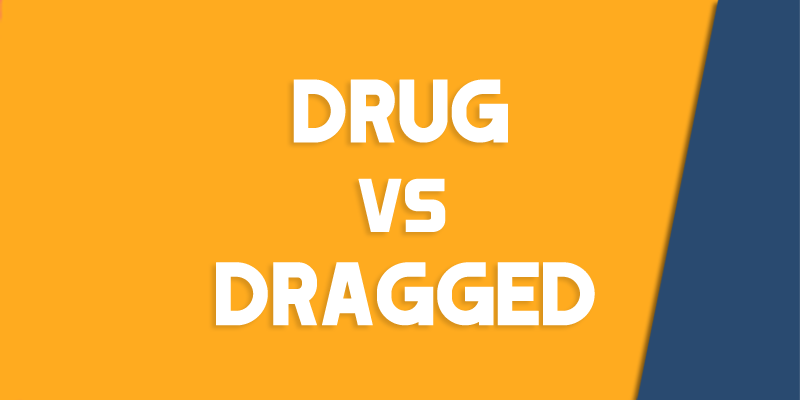Drug vs. Dragged – What’s the Gist?
The word drug and the term dragged both can function as two different parts of speech: nouns or verbs. These two words are not interchangeable or related at all, yet the confusion comes because of the past tense verb. This uncertainty arises when choosing the correct past tense verb form for drag. It should be dragged and not drugged.
In other words, the three principal parts for the word drug are drug, drugged, (have) drugged. For the term drag, they are drag, dragged, (have) dragged. The common inclination is to use the word drugged to mean the past tense of drag. This is incorrect. Just double the last letter and add the past tense ending –ed to form the second and the third principal parts of either word.
- Drug is a noun, which means a substance that is used in medicines; or as a transitive verb, meaning to affect with a medication.
- Dragged is a noun, indicating something is pulled or drawn along; or as a transitive verb, meaning to cause to move.

How to Use Drug in a Sentence
Drug definition: As a noun, this medicinal substance is typically intended for the diagnosis, treatment, or prevention of disease. However, it can also mean ingesting an illegal material in an unhealthful way.
In the verb form, drug also means to administer a medicine or to render incapacitated, but it often has a negative connotation.
For example:
- Because the patient was in excruciating pain, the physician prescribed the drug fentanyl. (Noun)
- Taking a cholesterol-lowering drug and implementing a healthful diet helps with maintaining an effective lifestyle. (Noun)
- As a result of being drugged, the girl was unaware of her surroundings. (Past Tense Verb)
The past tense of the word drug is drugged.
How to Use Dragged in a Sentence
Dragged definition: In addition to pulling along a surface, the noun drag can mean an object to that is used to drag, an encumbering burden, or a slowness or difficulty of motion. As a transitive verb, drag reflects the causation of movement, sometimes in a painful or sluggish way.
For example:
- The drag on the movement of the airplane delayed the passengers’ arrival time. (Noun)
- He dragged the heavy backpack off the bus and into the house. (Past Tense Verb)
- Time seems to drag while waiting in a dentist’s office makes. (Infinitive)
The past tense of the word drag is dragged, not drugged.
Outside Examples of Drug vs. Dragged
- Florida lawmakers are considering cracking down on cities and counties that file lawsuits against big corporations, a response to those communities that are suing drug makers and manufacturers over the opioid epidemic. –Tampa Bay Times
- Like the House Democrats’ bill, the legislation passed by the Republican-controlled Senate Finance Committee would require drugmakers to pay rebates if drug price increases exceed inflation and set annual out of pocket caps for enrolled patients. Those provisions have bipartisan support, as does another feature of both bills that would deter drugmaker “price gouging” when Medicare patients hit out-of-pocket spending caps, said the Campaign for Sustainable Drug Pricing. –USA Today
- The officers requested the driver step out of his vehicle, but he instead accelerated and dragged Thyne — who had become caught in the door — for about a block, Newport News Police Chief Steve Drew told reporters during an emotional news conference on Friday. –Daily News
- Instead of bashing America, WHO officials should be criticizing Beijing’s abusive methods of disease containment. Chinese officials are offering cash or free masks to anyone who squeals on sick neighbors. Suspected virus carriers are dragged from home and trucked to quarantine warehouses, where medical care is lacking but contracting the virus is almost guaranteed. –The New York Post
Phrases That Use Drug and Dragged
There are some idioms that use the word drug or dragged, including:
Do drugs: Someone who uses illicit drugs recreationally.
- When asked why, the addict responded, “I just do drugs.”
Drug of choice: Using a particular drug or doing a particular activity—colloquially called a “drug”—for comfort or relaxation.
- Because of stressful work weeks, Friday night movie night became her drug of choice.
Drag your feet: A person reluctantly or slowly doing a task.
- Because he wasn’t finished playing the video game, he dragged his feet getting to the dinner table.
What a drag: An unpleasant task or boring activity.
- She complained to her coworker on the way to the mandatory meeting, “What a drag!”
How to Remember These Words
Although you might be tempted to use the second principal part of drug (drugged) as the past tense of drag, just simply double the letter g and add the suffix –ed for dragged instead.
For example:
- The vet drugged the dog right before surgery.
- The vet dragged the reluctant dog across the floor and into the examination room.
Article Summary
Is drug or dragged correct? First determine whether you want the medicinal aspect of the noun or verb, or if you mean the restrictive movement in a noun or verb. If it is the former, choose drug. If it is the latter, use dragged.
Not to mention, if you use the word drugged as the past tense verb or past participle of dragged, you have likely committed a felony.
- Drug is both a noun and a verb relating to a medicinal substance.
- Dragged is a noun or a verb indicating a drawn or burdensome movement.
